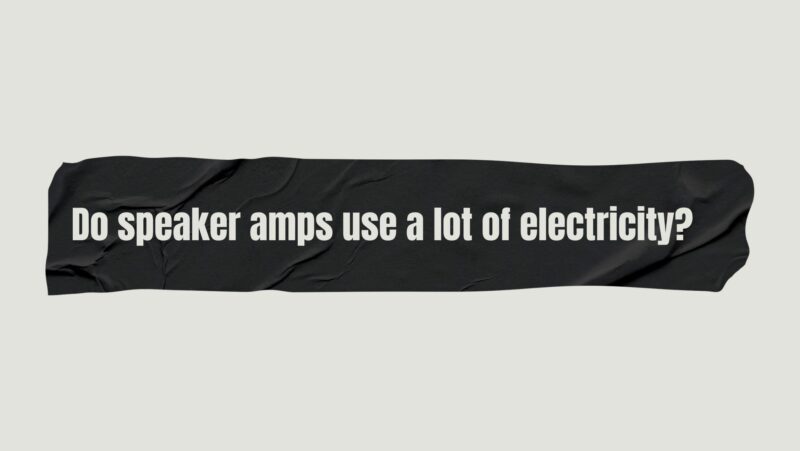In the realm of audio technology, where sonic enchantment meets technological innovation, questions about energy consumption become increasingly relevant. Among these inquiries, one frequently echoed is, “Do speaker amps use a lot of electricity?” This seemingly straightforward question delves into the intricate relationship between sound amplification and power consumption. In this article, we embark on a journey to unveil the nuances of speaker amplifier power consumption, exploring the factors that determine whether these devices draw a significant amount of electrical energy.
Amplification: From Electrical Currents to Sonic Waves
Amplifiers, often referred to as amps, are the magicians behind the curtain of audio, transforming electrical signals into the melodious symphonies and resonant dialogues that shape our auditory experiences. The process of amplification involves increasing the amplitude of weak electrical signals to drive speakers and create sound. However, this amplification comes at the cost of energy consumption, raising the question of whether speaker amps use a lot of electricity.
The Power Rating Dilemma: Watts as a Measure
At the heart of understanding speaker amplifier power consumption lies the power rating – an expression of an amplifier’s capacity to convert electrical power into sound output. Measured in watts, the power rating is indicative of an amplifier’s potential to drive speakers at specific volume levels while maintaining audio fidelity. However, it’s crucial to note that a power rating doesn’t signify a constant power draw but rather the maximum power an amplifier can deliver when needed.
Active vs. Passive Speakers: An Energy Divide
When discussing the power consumption of speaker amps, an essential distinction emerges between active and passive speaker setups. Active speakers possess built-in amplifiers, meaning they require electrical energy to drive both the amplification and sound reproduction components. On the other hand, passive speakers rely on external amplification and don’t directly consume electricity. However, the amplifier that powers passive speakers becomes the focal point in the energy consumption equation.
Amplifier Efficiency: A Keystone Variable
The power efficiency of an amplifier is a significant factor in determining whether speaker amps use a lot of electricity. Efficiency refers to how effectively an amplifier converts electrical power into sound output. Modern amplifiers, especially those designed for consumer use, often incorporate technologies to optimize energy usage. For instance, Class D amplifiers are renowned for their high efficiency, translating a considerable portion of electrical power into sound while minimizing wasteful heat generation.
Volume Levels and Their Influence
The relationship between amplifier power consumption and volume levels is a straightforward one. Higher volume levels require more power from the amplifier to deliver the desired sound intensity through the speakers. As a result, turning up the volume on an amplifier indeed leads to increased electricity consumption. This correlation underscores the careful balance between achieving sonic pleasure and conserving energy.
Content Complexity and Its Energy Implications
The nature of the audio content being played through the speakers also plays a role in power consumption. Music with wide dynamic ranges, transitioning between soft and loud passages, demands the amplifier to adjust its power output frequently to maintain consistent volume levels. This dynamic adaptation can impact power usage, particularly in amplifiers equipped with variable power modes or adaptive features.
Speaker Efficiency: A Key Player
The efficiency of the speakers connected to the amplifier contributes significantly to the power consumption equation. More efficient speakers require less power from the amplifier to achieve the same volume levels, potentially leading to lower overall energy consumption. The interaction between the amplifier’s power delivery and the speaker’s efficiency shapes the total energy drawn from the electrical source.
Striking a Harmonious Balance
The quest to determine whether speaker amps use a lot of electricity is not only about measuring power draw but also about balancing audio quality with energy efficiency. While high-wattage amplifiers might offer enhanced headroom for dynamic audio playback, it’s essential to tread the fine line between optimizing sound performance and practicing responsible energy usage.
Conclusion
In the symphony of audio technology, the query of whether speaker amps use a lot of electricity reverberates with both precision and artistry. Amplifiers, the architects of auditory experiences, transform electrical energy into sound waves, each note a testament to their power consumption. The energy dynamics of speaker amps, influenced by efficiency, volume levels, content complexity, and speaker efficiency, prompt a thoughtful exploration of technological harmony and environmental stewardship.
As we engage in the symphony of sound, understanding the impact of amplifier power consumption empowers us to make informed decisions. By carefully balancing sonic satisfaction with energy consciousness, we ensure that the resonance of our music remains in harmony not only with our auditory senses but also with the energy resources of our planet.


